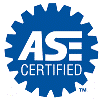
Archive for July 2022It's Brake Time (Brake Calipers)Posted July 31, 2022 1:42 AMRace car drivers have demonstrated the advantages of disc brakes, so most modern vehicles use them. Sometimes just the front wheels have disc brakes, but many vehicles now have them all the way around. A major component of the disc brake is called a caliper. It works by squeezing brake pads against the disc or rotor, kind of like a bicycle hand brake. The brake pads themselves are what contact the rotor, causing friction to build and the wheel to slow down, but it's the calipers that apply the pressure to the pads. Caliper design has evolved over the years, and there are two common types. One is called a floating caliper. It has one or two pistons on one side of the disc. When you push down the brake pedal, the piston or pistons in your caliper put pressure on that one side. A mechanism connected on the other side of the disc applies pressure as well, squeezing your disc so the vehicle stops. Floating calipers are less expensive since they have fewer parts. The other type is called a fixed caliper. They use pistons on both sides of the disc, sometimes several. They are often used in more high-performance or heavy-duty vehicles. Calipers can have rubber seals to keep out dirt, debris and moisture, but when that rubber wears out, sometimes the calipers can get contaminated. They can stick or start leaking; they can even rust. Then your caliper can get stuck applying that "squeeze" when you are not pressing on the brake pedal. Or they can get stuck in the other position, not applying stopping power when you press the pedal. When this happens, it's not unusual to feel your vehicle pull to one side when you brake. You might notice a burning smell from the constant friction if the caliper is stuck on, plus you may feel the heat from the wheel after you park and get out of your vehicle. Sometimes you'll hear a high-pitched sound or clunk if your calipers are binding up. That's your cue to have them checked out at your vehicle service center. If your calipers aren't working correctly, it can be a safety hazard. Sticking calipers can affect your ability to steer and stop; this is the kind of "brake time" you need so you can get them back on track and working properly. Kingwood Service Center Used Cars: Kingwood Service Center Advice on What to Do After You BuyPosted July 24, 2022 10:44 AMUsed vehicles are certainly an economical choice for budget-conscious Kingwood drivers. But how can we know we're getting a good used vehicle and not just inheriting someone else's problems? Kingwood Service Center TX: What Is the Risk of High Oil Change Intervals?Posted July 17, 2022 8:18 AMTX residents may have heard that vehicles don't need their oil changed as often as they used to. That's true. But it's not the whole story. When a vehicle only makes trips under four miles/six kilometers, or under 10 miles/16 kilometers in freezing conditions, the engine doesn't get warm enough for condensation in the oil to evaporate. The result? You get oil sludge build-up. If your driving patterns are the same as any of the conditions that count as severe, you should be changing your oil more frequently under the severe conditions schedule. When it comes to oil changes, a little information can go a long way to helping people save money and extend the life of their vehicles. Stay safe, and stay on the road. Kingwood Service Center
3318 Northpark Dr
Kingwood, TX 77339
(281) 360-7323
The Red Menace (How to Deal with Rust)Posted July 10, 2022 7:19 AMRust. It's worse if you drive in places that use salt on the roads in winter, or if you spend time driving near a body of salt water. But any vehicle has to deal with rust after years on the road. And it's not just that rust can eat away your vehicle's body and fenders. It can be a real problem around your suspension, drivetrain or any place where there's metal. Rust takes its time. You don't see it until it's already done its dirty work. It can wreak havoc with your electrical system. Sure, vehicle manufacturers do their best to keep it to a minimum, but especially with road treatments like brine around, their task is a difficult one. The one spot everyone notices is in the paint. You see a little bubbling under the once-smooth surface. By the time it bubbles, it's well involved in rotting away that spot of your vehicle. You wouldn't believe how just a little thing can start the process on its way. A stone chips the paint down to the metal, moisture and salt reach the steel and rust is off and running. It could be a scratch in the paint, a little dent, acid from a parking garage, tree sap, you name it. If you spot it, show it to your service advisor because rust can be more than a cosmetic problem. It can be a safety issue. While you can see the rust destroy your vehicle's body, you can't see it destroying your engine. But it can. It can eat away at such areas as air intakes or the exhaust system. Not only can it reduce performance, but also it can disable electrical connections. In this day and age where just about everything in your vehicle has a computer component to it, just a small electrical problem can strand you at the roadside. Corrosion can attack your vehicle's chassis or frame, and they are what provide the structural strength and stability for everything attached. Think powertrain, suspension, axles, window frames. The list goes on and on. Structural integrity is vital to safety, so the stakes are high. Now you can see why rust damages more than just the good looks of your vehicle. There's one thing to remember about corrosion - much of it is only visible from underneath the vehicle. When you bring your vehicle in to Kingwood Service Center for service, our technician can look for any problems from that important vantage point. It's always a good idea to point out any spots that you think might spell trouble. That way you can stay ahead of it and beat rust at its own game.
Move it or Lose It (Dormant Vehicles)Posted July 3, 2022 10:17 AMWhen it comes to your vehicle, driving it too much can cause some issues. But what about not driving a vehicle enough? That has consequences as well. Here are a few things that can happen if a vehicle isn't driven enough. When the engine doesn't operate, the oil isn't lubricating. That means some mechanisms that need periodic lubrication aren't getting it. And oil that sits around breaks down over time. In fact, some experts say you should change oil more often if your vehicle sits in the driveway than if you drive it regularly. You've heard that expression, "Take it on the highway and blow out the engine.” Well, carbon buildup used to be a problem in older vehicles. But the real culprit these days is moisture that builds up from combustion if your vehicle never gets hot enough to burn it off. That water vapor can mix with oil and cause sludge to form. There are many vehicle systems (battery, exhaust system, engine seals, etc.) that benefit from driving your vehicle at its optimal operating temperature for a while. Spark plugs can deteriorate unless they are fired up. The gas tank can rust from the inside if the metal is exposed from not having fuel in it. Rodents and insects may see a sitting vehicle as a luxury hotel. Brakes can rust after sitting around without being used. Seals and gaskets can dry out. One wise thing to do is check the operating manual. Some will spell out a maintenance schedule for vehicles that aren't driven regularly. One suggestion? Discuss your vehicle's maintenance with your service advisor. Let him or her know how often you drive the vehicle and what you use it for. Then, you can come up with a maintenance schedule tailored for you, one that might not be covered in the owner's manual. If you do have a vehicle that's been sitting around for a long time, it may be wise to have it towed to your service facility rather than trying to drive it with brakes that may not work, spark plugs that may not fire reliably and other systems that may compromise your safety and those of others on the road. You may think it's great to have a low-mileage vehicle that you've barely driven, but a complicated, sophisticated machine such as a car, SUV or truck needs regular attention to keep it running safely… and reliably. Kingwood Service Center | ||
SearchArchiveApril 2016 (16)May 2016 (5) June 2016 (4) July 2016 (4) August 2016 (5) September 2016 (4) October 2016 (5) November 2016 (4) December 2016 (4) January 2017 (5) February 2017 (4) March 2017 (4) April 2017 (5) May 2017 (4) June 2017 (4) July 2017 (4) August 2017 (4) September 2017 (3) October 2017 (4) November 2017 (5) December 2017 (3) January 2018 (5) February 2018 (4) March 2018 (4) April 2018 (5) May 2018 (4) June 2018 (4) July 2018 (5) August 2018 (4) September 2018 (5) October 2018 (4) November 2018 (4) December 2018 (5) January 2019 (5) February 2019 (4) March 2019 (4) April 2019 (4) May 2019 (4) June 2019 (5) July 2019 (4) August 2019 (4) September 2019 (5) October 2019 (4) November 2019 (4) December 2019 (5) January 2020 (5) February 2020 (4) March 2020 (5) April 2020 (4) May 2020 (5) June 2020 (4) July 2020 (4) August 2020 (5) September 2020 (4) October 2020 (4) November 2020 (5) December 2020 (4) January 2021 (6) February 2021 (4) March 2021 (4) April 2021 (4) May 2021 (5) June 2021 (4) July 2021 (4) August 2021 (5) September 2021 (4) October 2021 (5) November 2021 (4) December 2021 (4) January 2022 (6) February 2022 (4) March 2022 (4) April 2022 (4) May 2022 (5) June 2022 (4) July 2022 (5) August 2022 (4) September 2022 (4) October 2022 (5) November 2022 (4) December 2022 (4) January 2023 (5) February 2023 (4) March 2023 (4) April 2023 (5) May 2023 (4) June 2023 (4) July 2023 (5) August 2023 (4) September 2023 (4) October 2023 (5) November 2023 (4) December 2023 (5) January 2024 (5) February 2024 (4) March 2024 (5) April 2024 (2) | CategoriesAir Conditioning (12)Alignment (15)Alternator (4)Auto Safety (4)Automotive News (7)Battery (15)Brakes (13)Cabin Air Filter (8)Check Engine Light (4)Cooling System (15)Customer Detective Work (1)Dashboard (1)Diagnostics (4)Diesel Maintenance (1)Differential Service (2)Drive Train (5)Emergency Items (1)Engine Air Filter (1)Exhaust (8)Fluids (13)Fuel Economy (8)Fuel Saving Tip: Slow Down (2)Fuel System (37)Headlamps (5)Inspection (6)Keys to a long lasting vehicle (4)Maintenance (42)Monitoring System (3)Oil Change (4)Older Vehicles (4)Parts (6)Safe Driving (1)Safety (4)Serpentine Belt (5)Service Intervals (6)Service Standards (11)Shocks & Struts (5)Spark Plugs (2)Steering (12)Suspension (2)Timing Belt (5)Tire Rotation and Balancing (1)Tires (8)Tires and Wheels (33)TPMS (2)Transfer Case Service (1)Transmission (7)Trip Inspection (4)Warranty (1)Water Pump (1)What Customers Should Know (51)Wheel Bearings (1)Windshield Wipers (8)Winter Prep (3)Winter Tires (1) | |
What our clients are saying about us
We have established longterm and stable partnerships with various clients thanks to our excellence in solving their automotive needs!
Great folks!

Great place to get your car fix and the best customer service I've ever had.








